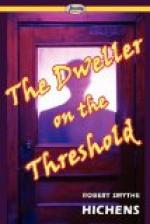Chichester did not follow, but the next day, on the pavement not far from the museum, he stopped once more in front of the professor with a “Good afternoon.”
“Good day,” said Stepton.
“Since you know who I am,” began the curate, “and I have heard so much of you, I hope you will forgive me for asking you something.”
“Certainly.”
“What is it in me which has attracted your attention?”
“I wish I knew,” returned the professor.
“You wish you knew! Do you mean that you don’t know?”
“I don’t know at all.”
“But—but—you—I was not wrong in feeling sure that you were—that something in me had aroused your attention?”
“Not wrong at all; but ‘something’ is not the word.”
“What is the word?”
“Everything. Everything in you rouses my attention, Mr. Chichester. But I can’t think why.”
“Did you know I was Mr. Harding’s curate the first time you met me?”
“Yes; I had seen you at St. Joseph’s once or twice when I came to hear your rector preach. You didn’t interest me at all then, I’m bound to say.”
Chichester stood in silence for a minute. Then he said:
“I might walk a little way back with you, if you have no objection.”
Stepton jerked his head in assent. And so the acquaintance of these two men was begun. Their first conversation was a delight to the professor. After a short silence the curate said:
“I could not help seeing each time we have met how your attention was fastened upon me.”
“Just so,” rejoined Stepton, making no apology.
“And I really think,” continued Chichester, with a sort of pressure—“I really think I am entitled to ask for some explanation of the matter.”
“Certainly you are.”
“Well?” He paused, then said again, “Well, Professor Stepton?”
“I’m afraid I’ve nothing to tell you, I like to stick to facts.”
“I only ask you for facts.”
“The facts amount to very little. Coming from the museum I ran across a man. You were the man. My attention was riveted at once. I said to myself, ‘I must see that man again.’ Next day I took my chance. I had luck. You were there at pretty much the same hour.”
“I always come from St. Joseph’s—”
“Exactly. And so it’s happened on several days. And that’s all I have to tell you.”
“But surely you can indicate why—”
“No, I can’t. All I can say is that for some reason, quite inexplicable by me, if I had come upon you in a crowd of a thousand, I should have had to attend to you.”
“That’s very strange,” said Chichester, in a low voice; “very strange indeed.”
“There’s a reason for it, of course. There’s a reason for everything, but very often it isn’t found.” At this point the professor thrust his head toward Chichester, and added, “you can’t tell me the reason, I suppose?”




